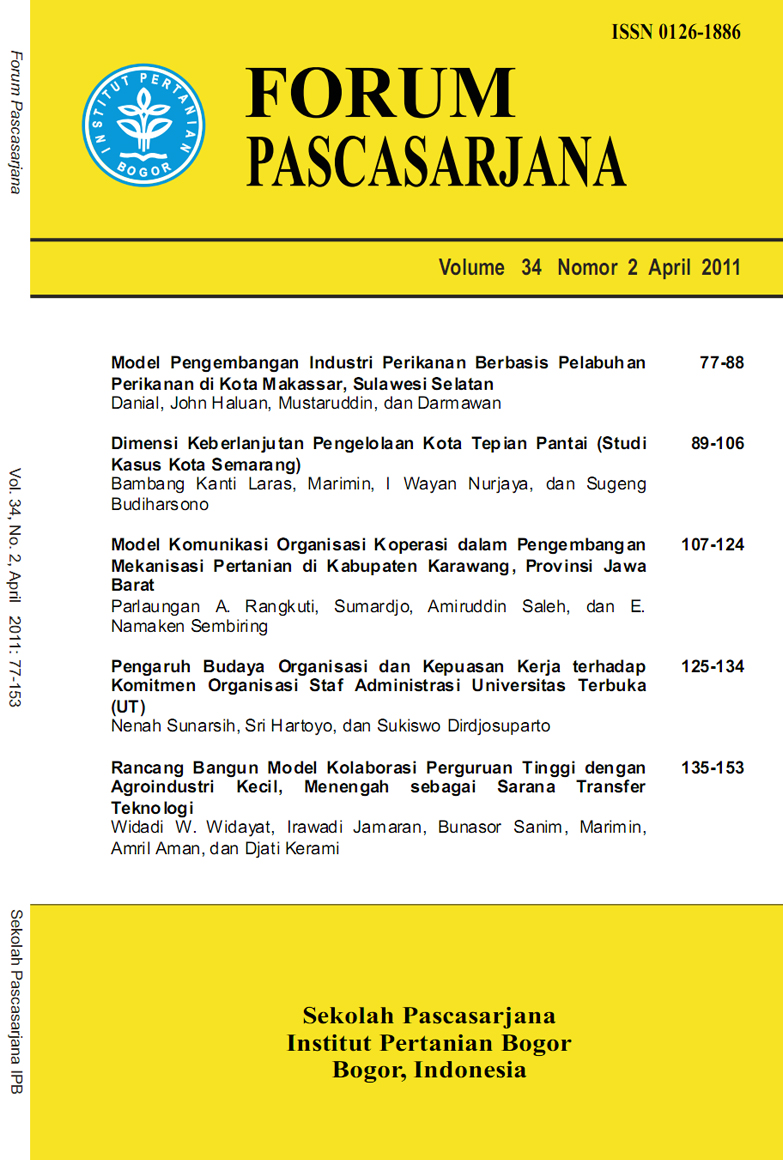<p class="MsoNormal" style="text-align:justify;text-indent:1cm;"><span class="longtext"><em><span style="font-size:10pt;" lang="in" xml:lang="in">This research interests to analyze factors affecting the organizational culture and job satisfaction and how far it affects the organizational commitment of the administrative staff of Indonesia open university (UT). </span></em></span><span class="longtext"><em><span style="font-size:10pt;" lang="in" xml:lang="in">This <span style="background:#FFFFFF none repeat scroll 0% 0%;">research</span> uses a sample of 150 administrative staff in the main office to represent the entire class based on the existing population by using </span></em></span><em><span style="font-size:10pt;" lang="in" xml:lang="in">stratified<span class="longtext"> random sampling method. <span style="background:#FFFFFF none repeat scroll 0% 0%;">Data obtained were analyzed by using structural equation modeling (SEM) with the help of LISREL 8.30 software. SEM analysis results reveal that the factors influencing the UT’s organizational culture are leaders appreciate ideas, accommodate ideas and suggestions, good ideas are not always responded by the top level for the leaders are not close enough to employees, institutions award when problems solved, leaders receive wise advice, institutions specifically encourage improvements in the workplace, and expects to increase and practice the valid work unit procedures. The factors that influence the job satisfaction in UT are being satisfied with the remuneration paid, promotion opportunities, praise, leaders’ skills, leaders’ assertive acts, the work environment, and coworker relationships</span>. <span style="background:#FFFFFF none repeat scroll 0% 0%;">Organizational culture and job satisfaction have directly and significantly positive effect on organizational commitment of the UT’s administration staff. These findings indicate that the more adaptive organizational culture and the higher job satisfaction, the higher organizational commitment for UT’s administrative staff.</span></span></span></em></p> <p class="MsoNormal" style="text-align:justify;"><span style="font-size:10pt;" lang="in" xml:lang="in"> </span></p> <em><span style="font-size:10pt;" lang="in" xml:lang="in">Key words</span></em><span style="font-size:10pt;" lang="in" xml:lang="in">: <span class="longtext"><em><span style="background:#FFFFFF none repeat scroll 0% 0%;">organizational culture</span></em></span><em>, <span class="longtext"><span style="background:#FFFFFF none repeat scroll 0% 0%;">job satisfaction</span></span>, <span class="longtext"><span style="background:#FFFFFF none repeat scroll 0% 0%;">organizational commitment</span></span></em></span>
Abstract
This research interests to analyze factors affecting the organizational culture and job satisfaction and how far it affects the organizational commitment of the administrative staff of Indonesia open university (UT). This research uses a sample of 150 administrative staff in the main office to represent the entire class based on the existing population by using stratified random sampling method. Data obtained were analyzed by using structural equation modeling (SEM) with the help of LISREL 8.30 software. SEM analysis results reveal that the factors influencing the UT’s organizational culture are leaders appreciate ideas, accommodate ideas and suggestions, good ideas are not always responded by the top level for the leaders are not close enough to employees, institutions award when problems solved, leaders receive wise advice, institutions specifically encourage improvements in the workplace, and expects to increase and practice the valid work unit procedures. The factors that influence the job satisfaction in UT are being satisfied with the remuneration paid, promotion opportunities, praise, leaders’ skills, leaders’ assertive acts, the work environment, and coworker relationships. Organizational culture and job satisfaction have directly and significantly positive effect on organizational commitment of the UT’s administration staff. These findings indicate that the more adaptive organizational culture and the higher job satisfaction, the higher organizational commitment for UT’s administrative staff.
Key words: organizational culture, job satisfaction, organizational commitment

